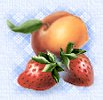IS MEAT NECESSARY FOR STRENGTH?

The old popular notion that meat is essential for strength is fast passing away.
The most convincing argument against this erroneous opinion is found in the actual test on
this question. Many persons have learned by experience that a well-balanced vegetarian diet
will maintain sound health and vigor. Almost whole nations are witnesses to the fact that
a nonflesh diet will give health of body and mind. A large proportion of the world's
population subsist on a meatless diet.
The strength of the lion and the ox is no argument for eating them in order to get strength.
The gorilla is said to be a match for the lion; and though he may be able to kill strong,
vicious animals, he does not eat them, but subsists on a vegetable diet. The horse, the
hippopotamus, the camel, the reindeer, and the elephant are examples of strong non-flesh-eating
animals.
Strip the question of all preconceived ideas and popular notion as to the superiority of meat
for giving strength, and we come to its food value as shown in the laboratory and in actual
performance. No scientific findings attribute to meat an unusual value for giving strength.
The principal food value of meat is in its protein content--a valuable food element, but
not one that gives great strength. The fat of meat supplies heat, but the fat is not what
gives meat its supposedly high food value. As a force producer, meat ranks only from one
seventh to one fourth as high as grains and nuts.
It is a matter of frequent mention that tasks calling for muscular strength and endurance
are performed better by vegetarians than by persons eating flesh. We may point to the
rice-eating Hindu messengers who have been known to run sixty miles a day consecutively
for weeks; to the Russian peasants who lived in normal times upon vegetables, black bread
and milk, and worked sixteen and eighteen hours a day; to the Japanese soldiers living
mostly on soybeans and rice, who in the 2nd World War surprised the world by their dauntless
courage and untiring energy in some of the toughest battles ever fought. Many scientific
tests have been made which prove beyond doubt that meat is not a strength food as it is
supposed to be. A few records of test are given here:
a. Running test--race of 125 miles: Entrants--thirty-two persons, of whom twelve
were meat eaters and twenty were vegetarians.
The race was won by a vegetarian eight hours ahead of the foremost meat eater. He had been
a vegetarian for nine years, and ate two meals daily. Only three meat eaters finished in
forty-five hours. Ten vegetarians finished in forty-five hours.
b. Holding the arms extended: Meat eaters averaged 10 minutes;
vegetarians averaged 49 minutes. Longest time held by meat eater was 20 minutes. Longest
time held by vegetarian was 200 minutes.
c. Keep knee bending: Meat eaters averaged 383 times;
vegetarians averaged 833 times.
A noted celebrity in the world of athletics is the vegetarian swimmer Murray Rose of
Australia, world champion and winner in the Olympic games. His diet practices have become
widely known. He has been a vegetarian since he was two years old. Not only does he swim
fast but his ability to spurt ahead at the finish demonstrates that superior endurance
accompanies a fleshless diet.
If there were a few instances only in which a vegetarian bill of fare thus shows itself
efficient for strength, that would be enough to prove that the vegetarian dietary is an
adequate one. The fact that in many instances of endurance tests the vegetarian diet wins
over the one of flesh demonstrates that it can be relied upon for endurance.
The relative endurance possible on a flesh or a non-flesh dietary is not altogether a matter
of relative nourishment. Not only does meat contain less nutrition than is found in the
natural diet, but it contains certain fatigue poisons. All the activities of an animal
involve tissue changes; and as a result of these, waste products are constantly present within
the tissues, and are in the process of elimination.
When an animal is slaughtered, the eliminative processes cease, and the waste products, on
their way to the kidneys for removal, are stayed in the bloodstream with stopping of the
heart and circulation. These body wastes, still poisonous, are sold and eaten as so much
"juicy" steaks, pork chops, lamb cutlets, and other forms of meat.
Another factor in the increase of toxic substances in the body under a flesh diet is the over
amount of protein eaten. Overeating of the best of food is harmful. Provision is not made
for storing an excess amount of protein.
Food experts tell us that the ratio of the tissue-building and repair protein element should
be one to ten of the fuel and energy carbohydrates food elements. This ratio is maintained
in the average balanced natural dietary. The addition of flesh food means an over amount
of protein and a factor of overwork for the kidneys.
The question of what we should eat ought not to be based upon fad or fancy; it is too
important a matter for experimentation or to be dealt with uncertainty. No guesswork should
enter into its consideration, and no unsound theories should influence decisions in reference
to it; for food is a most essential factor in health and disease. Our very blood is made
from the food we eat, and the blood is the life. An impoverished diet will give an inferior
quality of blood. The body is dependent upon food for its sustenance, for the body does not
produce strength, energy, and life of itself.
Because of the part that food plays in the development and maintenance of the body and its
functions, the question of diet is deserving of most thoughtful and conscientious study.
A desire to eat only that which is best for the body brings us to the study of vegetarianism.
There have been marked changes in opinions on this subject within the last century.
Especially within the past 50 years or so has science turned to careful investigation of
nutrition and food values. Vegetarianism has been subjected to this study and to most severe
tests. The two world wars forced nations to carry through large-scale food conservation
programs. With the shortage or animal proteins and fats, the knowledge of nutrition was
called into service to find substitute foods. The result of their findings not only saved
millions from disease and starvation, but developed some of the most striking and convincing
arguments in favor of vegetarianism. Many eminent authorities have been forced to acknowledge
not only that the vegetarian diet is adequate for human nutrition, but that it has definite
advantages over the flesh diet.
THE DIET THAT GOD GAVE

The first authority as to man's diet is found in the original provision covering his dietary,
by Him who made man and knows best his needs. "And God said, Behold, I have given you every
herb bearing seed, which is upon the face of all the earth, and every tree, in the which is
the fruit of a tree yielding seed; to you it shall be for meat."
We may safety take for granted that this original diet is ample, at least under normal
conditions. While it was given in Eden before man's moral fall, there is no reason to believe
that from a physiological standpoint, any greater modification is required than was afterward
made by God. Later the herbs of the field were given to man for food, and after the Flood,
when all vegetation was destroyed, permission was given him to eat the flesh of certain
animals. There is no Biblical ground for supposing that man's physiology has undergone any
change that makes necessary, on the bases of actual natural needs, the use of flesh as food.
Whatever Bible toleration or authority there may be for eating flesh is evidently not for
the purpose of encouraging the use of such as a regular article of diet. Although the
Israelites upon their settlement in the land of Canaan were permitted the use of animal food,
it was under careful restrictions which tended to lessen the evil results. Swine's flesh
was prohibited, as was also that of other animals, birds, and fish whose flesh was pronounced
unclean. Of the meats that were permitted, the eating of the fat and blood was strictly
forbidden. To comply fully with the instructions covering its use would mean that no meat
could be eaten unless the blood had been carefully drained from the animal and all fat removed.
Meat treated in this way has little flavor appeal left.
MAN NOT BUILT FOR MEAT EATING

What may be regarded as quite positive evidence as to the natural diet of man is seen in his
anatomical and digestive functions. Man holds a distinctive position, based upon the
classification made by science, which ranks the higher animal according to dietetic habits.
The herbivorous animals eat herbs and grass; the frugivorous fruits, grains, and nuts; the
carnivorous, flesh; and the omnivorous eat all these foods. An animal's scientific
classification is made according to its eating habit. Here science finds the most
positive identification.
Animals that eat flesh have long, sharp, pointed canine teeth for tearing their food apart.
These set considerably apart from the other teeth. The molars are saw-shaped. Man's teeth
are practically of even length, and set in a complete dental arch, with no space between them.
In number, form, and general arrangement, they are almost identical with the teeth of
frugivorous animals. Man's teeth are distinctly different from the teeth of other classes
of animals, and especially of the carnivorous.
In the carnivorous animals, the alimentary canal, or food tube, is short, only three times the
length of the body from the tip of the nose to the end of the backbone. In the frugivorous,
it is twelve times the length of the body.
If these characteristic features mean anything, we see that man is not fitted for eating flesh.
though he has, in times of scarcity of vegetable food, eaten meat, and while some races have
even subsisted largely on it, there is no indication of any change in man's anatomy to adapt
it to animal diet. From the natural formation of man, we may definitely understand that he is
suited to a vegetable diet.
--Northwestern Publishing Association

| 










